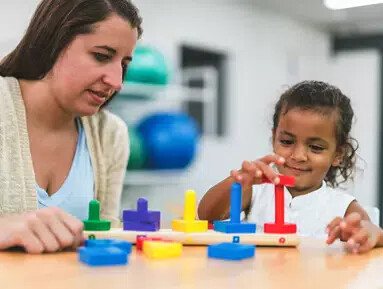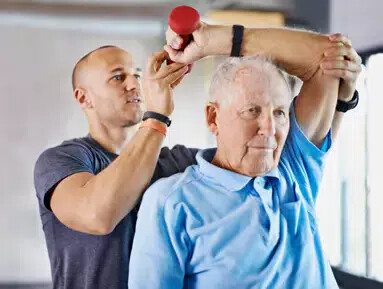RVCC is the only New Jersey community college offering an Occupational Therapy Assistant program
Application cycle for OTA program opens July every year. All cohorts have a January start. The RVCC OTA program is a full-time day program.
Train for A Rewarding In-Demand Career
Do you enjoy helping people of all ages? Do you want to make a difference in the lives of individuals who face challenges due to injury, disability or illness?
Consider a career in the fast-growing occupation of Occupational Therapy Assistant. Starting in the Spring 2018, Raritan Valley Community College became the only community college in New Jersey to offer the Associate of Applied Science Degree Program in Occupational Therapy Assistant. The program combines classroom instruction with clinical training in a community setting.
Occupational Therapy Assistants collaborate with occupational therapists to help people improve their functions so they can carry on daily life activities. They provide rehabilitative services to individuals with physical, emotional, mental or developmental impairments. From teaching a stroke victim to brush his teeth to helping a child in a wheelchair navigate a school hallway, Occupational Therapy Assistants help people of all ages handle daily tasks and regain their independence. Common occupational therapy interventions include helping children with disabilities to participate fully in school and social situations, helping people recovering from injury to regain skills, and providing supports for older adults experiencing physical and cognitive changes.
As an Occupational Therapy Assistant you’ll perform therapy treatments on patients as prescribed by an occupational therapist. Occupational Therapy Assistants can be found working in a variety of setting including occupational therapy offices, hospitals, skilled nursing facilities, out-patient facilities, schools, community-based health care centers, behavioral health programs and home health agencies.
Occupational Therapy Assistants are in high demand. Employment of occupational therapy assistants is projected to grow nationwide by 43 percent from 2014 to 2024, according to the US Bureau of Labor Statistics. The increased demand is in response to the health needs of the aging baby-boom generation and a growing elderly population.
For more information, contact Beau Younker, beau.younker@raritanval.edu
The Occupational Therapy Assistant program at Raritan Valley Community College is accredited by the Accreditation Council for Occupational Therapy Education (ACOTE) of the American Occupational Therapy Association (AOTA), located at 7501 Wisconsin Avenue, Suite 510E, Bethesda, MD 20814. ACOTE’s telephone number, c/o AOTA, is 301-652-AOTA and its web address is https://www.acoteonline.org.
For more information on the program’s outcomes, please visit National Board for Certification in Occupational Therapy.
Statement of Graduation Requirements for Raritan Valley Community College OTA Program
The Occupational Therapy Assistant (OTA) Program at Raritan Valley Community College is committed to equipping students with the necessary knowledge and skills to excel in their professional careers as valuable members of the healthcare team. To graduate from the OTA Program, students must successfully fulfill all required courses within the OTA curriculum with a grade of C (>70%) or better, and Fieldwork I & Fieldwork II experiences.





